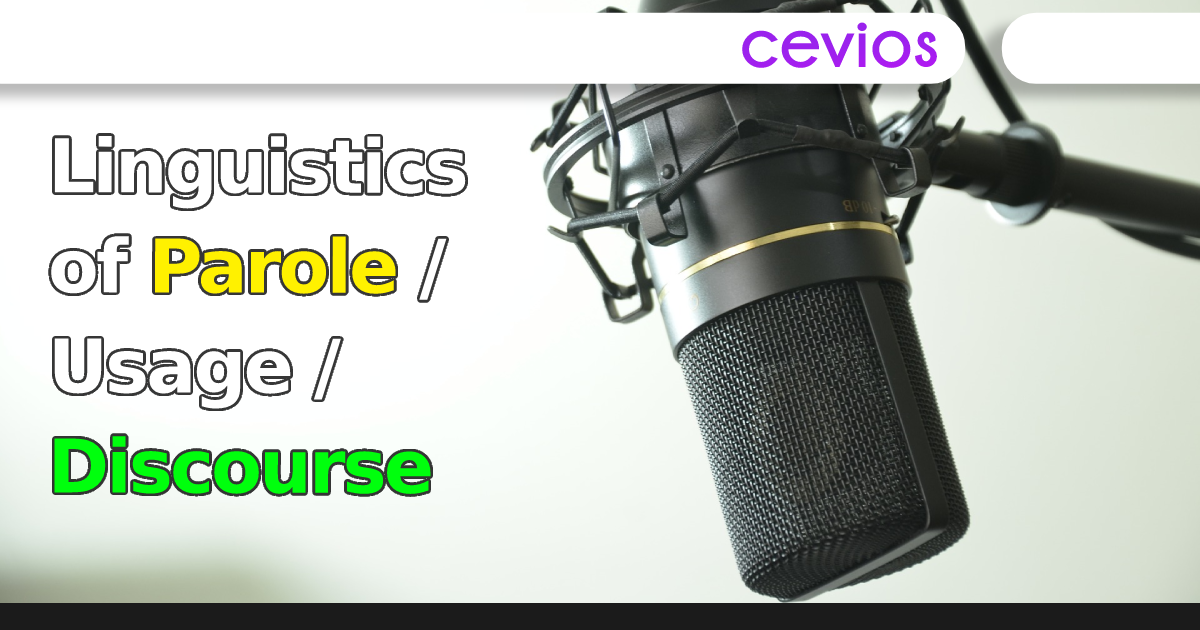Linguistics of Parole / Discourse / Usage[1]
Linguistics today is generally interested in language use; That is, Parole and more precisely discourse[2]. We could list, for instance:
– Sociolinguistics: This is one of the disciplines that take into consideration the social dimension of language. The first form of sociolinguistics explored variations and how speech changes from an individual/group/community to another by observing variables such as age, sex, race, social class, profession, and education…, etc. It later extended to cultural, political, communicational, and interactional questions…, etc.[3].
– Enunciation: It is among linguistics that are interested in the contextual meaning of texts. It takes into consideration the speaker and to whom he speaks, as well as the context that surrounds them including time and space. We can summarize it with a formula of I/you/here/now. There is, therefore, an énoncé each time these elements are available: In this case, the analyst talks about persons, time, and space indexes[4].
– Pragmatics[5]: The general principle of pragmatics is like that of enunciation: Pragmatics is also concerned with the contextual meaning of statements. It developed in the United States following philosophical reflections that insist on an essential function of language long neglected: Pragmatics adopts the thesis according to which language acts on the world, contrary to the historically predominant thesis that reduces its essential function to a simple description. One of its first theories is known as the speech act theory, which describes how language accomplishes actions through orders, interdictions, promises, felicitations, and declarations…, etc.[6].
– Discourse Analysis: It is misleading to tell what discourse analysis is without checking the various, sometimes conflictual definitions it has received during its development. By glancing at the different definitions, we may arrive at the same conclusion of that of the French discourse analyst Dominique Maingueneau: If discourse analysis is defined as the study of language in use in linguistics, we may easily confuse it with linguistics of parole/discourse/usage.
D. Maingueneau offers us a solution according to which Discourse Analysis should be distinguished from disciplines of discourse (sociolinguistics, pragmatics, conversational analysis…, etc.): Discourse Analysis brings together the linguistic, the psychological, and the sociological into one frame and relates texts to their social places. It can also study their genre and their organization. In this sense, Discourse Analysis integrates disciplines of discourse in its field without dissolving in them[7].
[1] The word “usage” was used by Louis Hjelmslev to replace the word “parole”. Cf. (Siouffi and Van Raemdonck, 100 fiches pour comprendre la linguistique, p.197)
[2] The words “parole” and “discourse” can be used interchangeably. Parole in this case is not entirely individual, it must be shared — to a certain degree — by at least a group of individuals. Cf. (Siouffi and Van Raemdonck, 100 fiches pour comprendre la linguistique, p.78) and (Sarfati, Eléments d’analyse du discours, p.11)
[3] Cf. (Calvet, La sociolinguistique.) et (Boyer, Introduction à la sociolinguistique.)
[4] Cf. (Sarfati, Eléments d’analyse du discours, pp.19–22)
[5] Do not confuse pragmatism (philosophy) and pragmatics.
[6] Cf. (Moeschler and Auchlin, Introduction à la linguistique contemporaine, pp.143–50)
[7] Cf. (Maingueneau, Les termes clés de l’analyse du discours, pp.11–12) and (Maingueneau, Discours et analyse du discours, pp.9–48)
“Linguistics of Parole / Discourse / Usage” is part of:
Khettab, Sid Ahmed. Semiotics and Semiology: From Sign to Semiosis and From Code to Discourse [Course]. 2021. DOI.org (Datacite), https://doi.org/10.13140/RG.2.2.23509.55520. [Online Article]
KHETTAB, Sid Ahmed. Semiotics and Semiology: From Sign to Semiosis and From Code to Discourse. Independently published, 2021, https://www.amazon.com/Semiotics-Semiology-Sign-Semiosis-Discourse/dp/B0959N6111. [Paperback]

